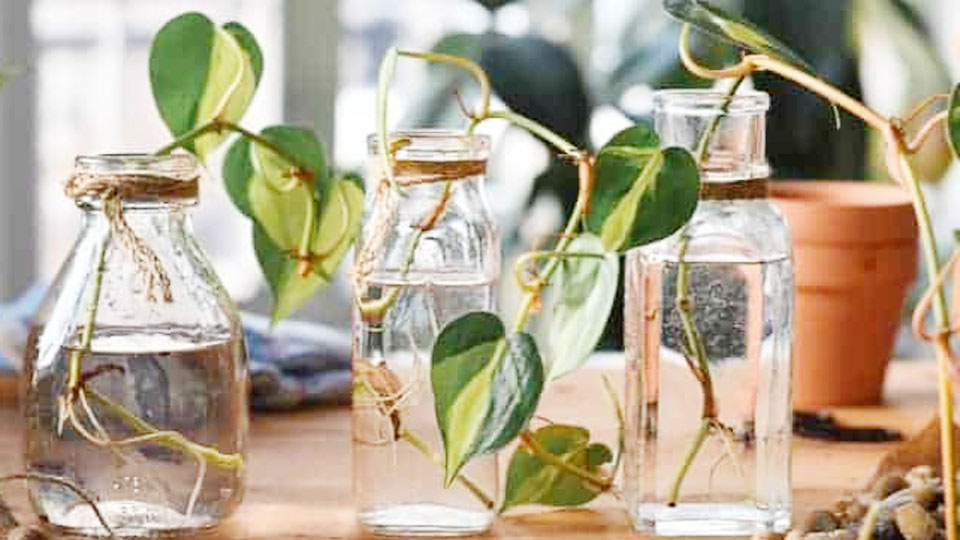Rooting plants from cuttings is an exciting way to grow your garden or increase your plant collection, but it can also be challenging. One of the most essential elements of successful propagation is the use of rooting hormones. While many gardeners may turn to synthetic rooting hormones, natural alternatives can offer just as much effectiveness.

Image by urbanorganicyield
I’ve explored the topic of natural rooting hormones and discovered some fantastic options. Let’s dive into the best natural rooting hormones and how to use them.
What Are Rooting Hormones?
Rooting hormones are substances that stimulate the growth of roots in plant cuttings. They contain auxins, which are naturally occurring plant hormones that play a key role in regulating growth and root formation.
When you apply rooting hormones, they help accelerate the rooting process and increase the likelihood of the cuttings developing strong, healthy roots.
While synthetic hormones like IBA (Indole-3-butyric acid) are commonly used, many gardeners, like myself, have turned to natural alternatives. Not only are these options more eco-friendly, but they are often more affordable and safer to use.
Why Use Natural Rooting Hormones?
The reasons for choosing natural rooting hormones are compelling. As gardeners, we strive to grow our plants in the most natural and sustainable way possible, and using organic alternatives can help us achieve this. Here are some benefits of using natural rooting hormones:
- Eco-Friendly: They do not harm the environment, unlike some synthetic chemicals.
- Affordable: Many natural rooting hormones can be made at home with ingredients that are easy to find.
- Safe for Plants: These alternatives are gentle on plants and can reduce the risk of chemical burns or toxic reactions.
- Sustainable: These methods often involve ingredients that are renewable and biodegradable.
Let’s take a look at some of the best natural rooting hormones that can help you propagate your plants with confidence.
Willow Water: A Natural Powerhouse for Rooting
Willow trees are naturally rich in auxins, particularly indole-3-butyric acid (IBA), a powerful compound that encourages root development. This makes willow water one of the most popular natural rooting hormones.
How to Make Willow Water:
Making willow water is a simple process that involves using the twigs or branches of willow trees.
- Harvest Willow Twigs: Choose fresh, young willow branches and cut them into small pieces.
- Soak the Twigs: Place the pieces in a container and pour boiling water over them.
- Let it Steep: Allow the willow pieces to steep in the water for 24 to 48 hours.
- Strain and Store: After steeping, strain the liquid and store it in a clean container.
How to Use Willow Water:
Soak your plant cuttings in the willow water for about 2 to 3 hours before planting them. The natural auxins will encourage rapid root growth and help the cutting establish itself faster.
Aloe Vera: The Healing Gel for Root Development
Aloe vera is known for its healing properties, but it also serves as a fantastic rooting hormone. The gel inside aloe vera contains various enzymes, amino acids, and plant hormones that help promote root growth.
How to Use Aloe Vera:
- Extract the Gel: Cut open a fresh aloe vera leaf and scoop out the gel.
- Apply the Gel: Dip the cut end of the plant cutting into the gel, ensuring it’s thoroughly coated.
- Plant the Cutting: After dipping, plant the cutting into the growing medium as usual.
Aloe vera is gentle yet effective, and it can also protect your cuttings from potential infections while they root.
Honey: Nature’s Antibacterial Agent
Honey is another natural substance with multiple uses in gardening, one of which is promoting root growth. While honey doesn’t directly contain rooting hormones, it has excellent antibacterial and antifungal properties that can help prevent infection and encourage successful rooting.
How to Use Honey:
- Mix Honey Solution: Combine one tablespoon of honey with two cups of boiling water to create a honey solution.
- Cool and Apply: Allow the solution to cool to room temperature.
- Dip the Cutting: Dip the cut end of your cutting into the honey solution before planting it.
The protective properties of honey help the cutting stay healthy and avoid disease while rooting.
Cinnamon: A Simple Yet Effective Solution
Cinnamon is well known as a natural antifungal agent, making it a useful addition to your rooting hormone toolkit. It can help prevent fungal diseases from attacking your cuttings during the rooting process, which can improve the chances of successful propagation.
How to Use Cinnamon:
- Moisten the Cutting: Lightly moisten the base of your cutting.
- Dip in Cinnamon Powder: Sprinkle or dip the cut end of the cutting into ground cinnamon until it is well-coated.
- Plant the Cutting: Proceed to plant your cutting as usual.
Cinnamon acts as a natural protective barrier, ensuring that pathogens don’t interfere with the rooting process.
Apple Cider Vinegar (ACV): A Root-Stimulating Solution
Apple cider vinegar contains acetic acid, which can stimulate root growth in cuttings when used in moderation. It’s important to dilute the ACV to avoid harming the plant, as its strong acidity can be detrimental in large quantities.
How to Use Apple Cider Vinegar:
- Dilute the ACV: Mix one teaspoon of apple cider vinegar with about five to six cups of water.
- Dip the Cutting: Dip the base of the cutting in the diluted ACV solution for a few seconds.
- Plant the Cutting: After dipping, plant the cutting in its growing medium.
Use this solution sparingly to avoid over-acidifying the soil or harming the cutting.
Coconut Water: A Miracle for Plant Growth
Coconut water is full of nutrients and plant hormones, particularly cytokinins, which are known to encourage cell division and root development. It is a powerful yet gentle rooting agent that works wonders for cuttings.
How to Use Coconut Water:
- Obtain Fresh Coconut Water: Use fresh coconut water (not the canned variety, which may contain preservatives).
- Soak the Cuttings: Submerge your cuttings in coconut water for several hours, allowing them to soak up the nutrients.
- Plant the Cutting: After soaking, plant your cutting in its medium as you normally would.
Coconut water offers both nutrients and natural growth hormones, making it an excellent choice for promoting rooting.
Tips for Successful Rooting with Natural Hormones
Choose Healthy Cuttings: Always use healthy, disease-free cuttings to ensure the best chances of success.
Keep Tools Clean: Sterilize your scissors or pruning shears before making cuts to avoid transmitting diseases.
Maintain Proper Conditions: Provide your cuttings with the right humidity, warmth, and light conditions to encourage root growth.
Be Patient: Natural rooting hormones often work more gradually than synthetic alternatives, so give your cuttings time to develop.
Conclusion
Rooting cuttings and watching them grow into mature plants is a rewarding experience. Using natural rooting hormones is not only effective but also a safer and more sustainable way to promote strong root systems.
If you choose willow water, aloe vera, honey, cinnamon, apple cider vinegar, or coconut water, each option offers unique benefits.
By using these natural alternatives, you can propagate your plants successfully without relying on harsh chemicals, all while supporting a greener, more eco-friendly gardening practice.
Rooting plants can take time, but with the right natural rooting hormones and care, you’ll be rewarded with thriving plants ready to grow in your garden.
Frequently Asked Questions (FAQs)
Can I mix different natural rooting hormones together?
Yes, you can mix natural rooting hormones, but always use them in moderation. For example, you could dip your cuttings in aloe vera gel and then coat them with cinnamon for added protection against fungi.
How often should I replace the willow water?
Willow water can last for about a week if stored in a cool, dark place. However, it’s best to prepare fresh batches every few days for optimal effectiveness.
Are natural rooting hormones safe for all types of plants?
Yes, natural rooting hormones are generally safe for most plants, but always do some research on the specific needs of the plant species you’re propagating to ensure success.
How long does it take for cuttings to root using natural hormones?
Rooting times can vary based on the plant species and the rooting hormone used. Generally, it can take anywhere from a few weeks to a couple of months.
Can I use these natural rooting hormones on large cuttings or just small ones?
These natural hormones work on both small and large cuttings, but larger cuttings may take longer to root and may need extra care during the rooting process.

I’m Marissa Lynn, the proud author behind GardeningProperty.com! With a deep-rooted passion for all things green and growing, I’ve dedicated years to mastering the art and science of gardening.
From nurturing vibrant flowerbeds to cultivating thriving vegetable gardens, I love sharing practical tips, creative ideas, and proven techniques to help others create their dream outdoor spaces.